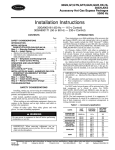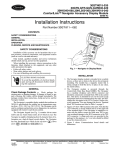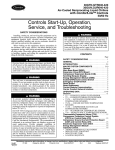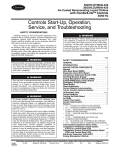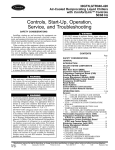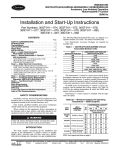Download Carrier 30GTN015-035 Specifications
Transcript
30GTN015-035 Reciprocating Liquid Chillers with ComfortLink™ Controls 50/60 Hz Installation Instructions CONTENTS Page SAFETY CONSIDERATIONS . . . . . . . . . . . . . . . . . . . . . . 1 INSTALLATION . . . . . . . . . . . . . . . . . . . . . . . . . . . . . . . . .1-11 Step 1 — Rig and Place the Unit. . . . . . . . . . . . . . . . . . 1 • RIGGING • PLACING UNIT • MOUNTING UNIT Step 2 — Check Compressor Mounting . . . . . . . . . . 3 Step 3 — Cooler Fluid and Drain Piping Connections . . . . . . . . . . . . . . . . . . . . . . . . . . . . . . . . . . . . 3 • PREPARATION FOR YEAR-ROUND OPERATION • PREPARATION FOR WINTER SHUTDOWN Step 4 — Make Electrical Connections . . . . . . . . . . . 7 • POWER SUPPLY • POWER WIRING Step 5 — Install Accessories . . . . . . . . . . . . . . . . . . . . 11 • ELECTRICAL • HOT GAS BYPASS Step 6 — Refrigerant Circuit. . . . . . . . . . . . . . . . . . . . . 11 • LEAK TESTING • DEHYDRATION • REFRIGERANT CHARGE SAFETY CONSIDERATIONS Installing, starting up, and servicing air-conditioning equipment can be hazardous due to system pressures, electrical components, and equipment location (roofs, elevated structures, etc). Only trained, qualified installers and service mechanics should install, start up, and service this equipment (Fig. 1). Untrained personnel can perform basic maintenance functions such as cleaning coils. All other operations should be performed by trained service personnel. When working on the equipment, observe precautions in the literature and on tags, stickers, and labels attached to the equipment. • Follow all safety codes. • Wear safety glasses and work gloves. • Keep quenching cloth and fire extinguisher nearby when brazing. • Use care in handling, rigging, and setting bulky equipment. • See Tables 1A and 1B for Physical Data. Fig. 1 — Model 30GTN (020 Shown) INSTALLATION Step 1 — Rig and Place the Unit RIGGING — Preferred method is with spreader bars from above the unit. Use 2-in. (50 mm) OD pipe or hooks in lifting holes. Rig with 4 cables and spreader bars. All panels must be in place when rigging. See rigging label on unit for details concerning shipping weights, distance between lifting holes, center of gravity, and spreader bar dimensions. See Fig. 2. If overhead rigging is not possible, place chiller on skid or pad for rolling or dragging. When rolling, use a minimum of 3 rollers. When dragging, pull the pad. Do not apply force to the unit. When in final position, raise from above to lift unit off pad. All panels must be in place when rigging. PLACING UNIT — There must be at least 4 ft (1.2 m) for service and for unrestricted airflow on all sides of unit, and a minimum of 8 ft (2.4 m) clear air space above unit. Provide ample room for servicing cooler. For cooler removal see clearance requirements in Fig. 3-5. For multiple units, allow 8 ft (2.4 m) separation between units for airflow and service. If unit is to be used in an area with high solar radiation, mounted position should be such that control box is not exposed to direct solar radiation. Exposure to direct solar radiation could affect the temperature switch controlling cooler heaters. See Table 2. ELECTRIC SHOCK HAZARD Open all remote disconnects before servicing this equipment. Manufacturer reserves the right to discontinue, or change at any time, specifications or designs without notice and without incurring obligations. PC 903 Catalog No. 563-068 Printed in U.S.A. Form 30GTN-10SI Pg 1 1-00 Replaces: New Book 2 Tab 5c Table 1A — Physical Data — 60 Hz → UNIT 30GTN COMPRESSOR No. ...Type No. Cyls (ea)...Speed, Rpm (r/s) Capacity Steps Oil Charge*, Pt (L) REFRIGERANT CHG, R-22 Total/Over Clear Glass, lb (kg) CONDENSER FANS, Type No. ...Diameter, in. (mm) Total Airflow, Cfm (L/s) Speed, Rpm (r/s) CONDENSER COIL, Type Rows...Fins/in. (Fin Spacing mm) Total Face Area, sq ft (m2) COOLER Net Water Volume, gal. (L) Maximum Design Working Pressure psig (kPa) WATER CONNECTIONS, in. Inlet and Outlet Drain 015 020 1...06DG537 6...1750 (29) 3 8 (3.8) 1...06E2250 4...1750 (29) 2 17 (8.0) 25.0 (11.3)/5.0 (2.3) 31.0 (14.1)/7.0 (3.2) 2...30 (762) 10,600 (5000) 1140 (19) 2...19 (1.34) 23.5 (2.18) 3...17 (1.49) 23.5 (2.18) 6.8 (25.7) 025 Reciprocating, Semi-Hermetic 1...06E7265 6...1750 (29) 3 21 (9.9) 030 035 1...06E7275 6...1750 (29) 3 21 (9.9) 1...06E7299 6...1750 (29) 3 19 (9.0) 40.0 (18.1)/12.0 (5.4) 47.0 (21.3)/14.0 (6.4) Propeller Type, Direct Drive 2...30 (762) 15,700 (7400) 1140 (19) Horizontal Plate Fin 2...19 (1.34) 3...17 (1.49) 39.2 (3.64) 39.2 (3.64) Shell and Tube, Direct Expansion 9.9 (37.5) Refrigerant Side — 235 (1620) Water Side — 150 (1034) 57.0 (25.9)/8.0 (3.6) 3...30 (762) 23,700 (11 200) 1140 (19) 3...17 (1.49) 58.4 (5.43) 12.8 (48.4) 21/2 FPT 3/4 MPT 2 FPT MPT 3/4 *See Oil Charge section for Carrier-approved oil. Table 1B — Physical Data — 50 Hz → UNIT 30GTN COMPRESSOR No. ...Type No. Cyls (ea)...Speed, Rpm (r/s) Capacity Steps Oil Charge*, Pt (L) REFRIGERANT CHG, R-22 Total/Over Clear Glass, lb (kg) CONDENSER FANS, Type No. ...Diameter, in. (mm) Total Airflow, Cfm (L/s) Speed, Rpm (r/s) CONDENSER COIL, Type Rows...Fins/in. (Fin Spacing mm) Total Face Area, sq ft (m2) COOLER Net Water Volume, gal. (L) Maximum Design Working Pressure psig (kPa) WATER CONNECTIONS, in. Inlet and Outlet Drain 015 020 025 Reciprocating, Semi-Hermetic 1...06E7265 1...06E7275 6...1450 (24.2) 6...1450 (24.2) 3 3 21 (9.9) 21 (9.9) 1...06E2250 4...1450 (24.2) 2 17 (8.0) 26.0 (11.8)/6.0 (2.7) 2...30 (762) 10,600 (5000) 950 (15.8) 2...19 (1.34) 23.5 (2.18) 6.8 (25.7) 1201 2 FPT MPT 2 1...06E7299 6...1450 (24.2) 3 19 (9.0) 35.0 (15.9)/8.0 (3.6) 42.0 (19.0)/12.0 (5.4) 49.0 (22.2)/14.0 (6.4) Propeller Type, Direct Drive 2...30 (762) 15,700 (7400) 950 (15.8) Horizontal, Plate Fin 3...17 (1.49) 2...19 (1.34) 3...17 (1.49) 23.5 (2.18) 39.2 (3.64) 39.2 (3.64) Shell and Tube, Direct Expansion 9.9 (37.5) Refrigerant Side — 235 (1620) Water Side — 150 (1034) 3/4 *See Oil Charge section for Carrier-approved oil. 030 are field supplied. Be sure unit is level to ensure proper oil return to compressor. Step 2 — Check Compressor Mounting — As shipped, compressor is held down by 4 bolts. After unit is installed, loosen each bolt using nut indicated in Fig. 6 until the flat washer (3/8 in.) can be moved with finger pressure. Step 3 — Cooler Fluid and Drain Piping Connections — When facing the cooler side of the unit, the re- UNIT 30GTN 015 020 025 030 035 MAXIMUM SHIP WT Lb Kg 1876 851 2031 921 2415 1095 2606 1182 3365 1526 LIFTING HOLES “A” in. mm 94.0 2388 94.0 2388 94.0 2388 94.0 2388 127.0 3225 turn water connection is on the left and the leaving water connection is on the right. See Fig. 3-5 and 7. Install a minimum 40-mesh strainer in the cooler fluid inlet line just ahead of and as close as possible to the cooler. Provide a means of venting air from the high point of the field-installed piping. After field piping is complete, freeze-up protection is recommended using inhibited ethylene glycol or other suitable inhibited antifreeze solution and electric heat tapes in area where piping is exposed to low ambient temperatures (34 F [1 C] or below). Heat tapes should possess a rating for area ambients and be covered with a suitable thickness of closed-cell insulation. Route power for heating tapes from a separatelyfused disconnect. Identify disconnect as heat tape power source with a warning that power must not be turned off except when unit is being serviced. The cooler drain connection is at the opposite end from the compressor (See Fig. 3-5). Insulate the drain piping (in the same manner as the chilled water piping) for at least one ft (305 mm) from cooler. PREPARATION FOR YEAR-ROUND OPERATION — If unit is on year-round operation, add sufficient inhibited ethylene glycol or other suitable inhibited antifreeze solution to chilled water to prevent freezing under low-ambient operating conditions. Consult local water authority on characteristics of area water and add a recommended inhibitor to the chilled water. PREPARATION FOR WINTER SHUTDOWN — Do not shut off control power disconnect during off-season shutdown. At end of cooling season: 1. Drain water from system. 2. Replace drain plug and put 2 gallons (8 liters) of inhibited ethylene glycol (or other suitable inhibited antifreeze) in cooler to prevent freezing of residual water. (Remove plug on top of leaving chilled water nozzle to add liquid.) 3. At the beginning of the next cooling season, refill cooler and add recommended inhibitor. CENTER OF GRAVITY “B” in. 48.0 47.5 51.0 51.0 66.5 mm 1219 1207 1295 1295 1689 “D” “C” in. 23.0 23.0 34.5 34.5 35.5 mm 583 583 876 876 901 in. 49.5 49.5 73.5 73.5 73.5 mm 1256 1256 1867 1867 1867 Fig. 2 — Rigging with Spreader Bars (Field Supplied) Table 2 — Temperature Limits for Standard Units TEMPERATURE Maximum Ambient Temperature Minimum Ambient Temperature Maximum Cooler EWT* Maximum Cooler LWT Minimum cooler LWT† F 125 0 95 70 38 C 52 –18 35 21 3.3 LEGEND EWT — Entering Fluid (Water) Temperature LWT — Leaving Fluid (Water) Temperature *For sustained operation, EWT should not exceed 85 F (29.4 C). †Unit requires modification below this temperature. MOUNTING UNIT — When unit is in proper location, use of mounting holes in base rails is recommended for securing unit to supporting structure, or for mounting unit on vibration isolators if required. See Fig. 3-5. Fasteners for mounting unit 3 NOTES: 1. There must be minimum 8 ft (2.4 m) clear air space above unit. 2. Dimensions in [ ] are in millimeters. 3. The approximate operating weight of the unit is: 50 Hz 60 Hz UNIT 30GTN015 30GTN015C 30GTN020 30GTN020C UNIT 30GTN015 30GTN020 Lb 1640 1732 1821 1945 Kg 744 786 826 882 A (1219) 4′′-0″″ (1207) 3′′-111/2″ UNIT 30GTN015 30GTN015C 30GTN020 30GTN020C C COMPR MTG NEC VAV — — — — — Lb 1741 1833 1864 1988 Kg 790 831 846 902 LEGEND Copper Coils Compressor Mounting National Electrical Code (U.S.A.) Variable-Air Volume Fig. 3 — Dimensional Drawing, 30GTN015,020 4 NOTES: 1. There must be minimum 8 ft (2.4 m) clear air space above unit. 2. Dimensions in [ ] are in millimeters. 3. The approximate operating weight of the unit is: 60 Hz UNIT 30GTN025 30GTN025C 30GTN030 30GTN030C C COMPR MTG NEC VAV — — — — — Lb 2170 2324 2268 2474 50 Hz Kg 984 1054 1029 1122 UNIT 30GTN025 30GTN025C 30GTN030 30GTN030C Lb 2193 2347 2332 2538 Kg 995 1065 1058 1151 LEGEND Copper Coils Compressor Mounting National Electrical Code (U.S.A.) Variable-Air Volume Fig. 4 — Dimensional Drawing, 30GTN025,030 5 NOTES: 1. There must be minimum 8 ft (2.4 m) clear air space above unit. 2. Dimensions in [ ] are in millimeters. 3. The approximate operating weight of the unit is: 60 Hz UNIT 30GTN035 30GTN035C C COMPR MTG NEC — — — — Lb 2965 3273 Kg 1345 1485 LEGEND Copper Coils Compressor Mounting National Electrical Code (U.S.A.) Fig. 5 — Dimensional Drawing, 30GTN035 6 NOTE: All dimensions are in inches. Fig. 6 — Compressor Mounting power to the Main Base Board (MBB) is off. They are protected by a 7-amp fuse in field-supplied control power supply disconnect. 3. The control circuit field-supplied disconnect should never be off except when unit is being serviced or is to be down for a prolonged period, in which case cooler should be drained. When operation is resumed, crankcase heater should be energized for 24 hours before start-up. 4. Power entry is at one end only. 5. Maximum field wire sizes allowed by lugs on terminal block are: 350 kcmil for 30GTN030,035 (208/230-3-60) and 30GTN030 (230-3-50) units. 2/0 AWG for all other units. 6. Terminals for field power supply are suitable for copper, copper-clad aluminum, or aluminum conductors. Insulation must be rated 167 F (75 C) minimum. Field Connections Main Power — Bring wires from the fused disconnect switch through hole in bottom rail of unit to control box (Fig. 3-5) and connect to terminals on terminal block TB1 (See Fig. 8). Control Power — Bring separate source power (see Fig. 8, note 2) into unit as shown in Fig. 3-5. This supplies power for control circuit, compressor crankcase heater, and cooler heater. Connect incoming wires to TB4 in unit control box (L1 to Liquid Chiller REFRIGERATING MACHINE U.N.2857 IN WATER INLET (RETURN WATER) OUT WATER OUTLET (LEAVING WATER) WATER DRAIN Fig. 7 — Water Connection Locations Step 4 — Make Electrical Connections POWER SUPPLY — Electrical characteristics of available power supply must agree with unit nameplate rating. Supply voltage must be within limits shown in Tables 3A and 3B. IMPORTANT: Operating unit on improper supply voltage or with excessive phase imbalance constitutes abuse and may affect Carrier warranty. POWER WIRING — All power wiring must comply with applicable local and national codes. Install field-supplied branch circuit fused disconnect(s) per NEC (National Electrical Code, U.S.A.) of a type that can be locked OFF or ON. Disconnect(s) must be within sight from and readily accessible from unit in compliance with NEC Article 440-14. General Wiring Notes 1. The control circuit power must be from a separate source and must be brought through a field-supplied fused disconnect rated at 15 amps for 230-v and 30 amps for 115-v control power. Two terminal blocks are provided for field-wired control devices. 2. Crankcase and cooler heaters are wired in the control circuit so they are always operable as long as the control power disconnect is on and safety device is open or the Enable-Off-Remote contact switch is in the Off position. Heaters are wired so that they are energized even when and L2 to ). Neutral side must be connected to the neutral terminal block (by C-A1) for 380-3-60 and 400-3-50 V units only. In the auxiliary power supply a field-supplied disconnect with 15-amp circuit protection must be provided to accommodate crankcase heater and cooler heater cable. To comply with NEC Article 440-14, the disconnect must be located within sight from and readily accessible from unit. IMPORTANT: To ensure power to the heaters, make sure auxiliary power to unit is always on (except for servicing or prolonged shutdown). A toggle switch (marked Emergency On-Off on the unit label diagram and by the switch) allows the control circuit to be manually disconnected when necessary. This switch does not affect the crankcase heater and cooler heater cable. 7 Table 3A — Electrical Data — Standard Unit UNIT SIZE 30GTN 015 020 025 030 035 UNIT Voltage V-Hz (3 Ph) 208/230-60 460-60 575-60 380-60 380/415-50 208/230-60 460-60 575-60 380-60 380/415-50 208/230-60 460-60 575-60 380-60 380/415-50 208/230-60 460-60 575-60 380-60 380/415-50 208/230-60 460-60 575-60 380-60 Supplied* Min Max 187 253 414 506 518 633 418 342 342 440 187 253 414 506 518 633 418 342 342 440 187 253 414 506 518 633 418 342 342 440 187 253 414 506 518 633 418 342 342 440 187 253 414 506 518 633 418 342 MCA 82.2 38.3 31.7 43.9 49.4 97.4 49.6 42.9 51.1 60.5 124.7 60.7 52.4 64.7 68.5 145.5 68.7 54.9 73.6 87.8 203.0 91.1 81.6 111.1 MOCP 125 60 50 70 80 150 80 70 80 100 200 100 80 110 110 250 110 90 125 150 350 150 125 175 ICF 278.4 126.2 102.8 152.8 179.0 357.4 179.2 126.8 198.8 229.0 458.4 229.2 170.8 254.8 259.0 518.4 259.2 182.8 287.8 351.0 708.6 354.3 286.2 393.7 See Legend and Notes on page 9. 8 Rec Fuse Size 100 45 40 60 60 125 60 60 60 80 150 80 70 80 90 175 90 70 90 110 250 110 100 150 V-Hz (Single Ph) 115-60 115-60 115-60 230-60 230-50 115-60 115-60 115-60 230-60 230-50 115-60 115-60 115-60 230-60 230-50 115-60 115-60 115-60 230-60 230-50 115-60 115-60 115-60 230-60 CONTROL CIRCUIT Supplied MCA and MOCP Min Max 104 127 30 104 127 30 104 127 30 198 254 15 198 254 15 104 127 30 104 127 30 104 127 30 198 254 15 198 254 15 104 127 30 104 127 30 104 127 30 198 254 15 198 254 15 104 127 30 104 127 30 104 127 30 198 254 15 198 254 15 104 127 30 104 127 30 104 127 30 198 254 15 Table 3B — Electrical Data — Unit with Factory-Installed Motormaster® I Control UNIT SIZE 30GTN 015 020 025 030 035 UNIT Supplied* Min Max 187 253 414 506 518 633 418 342 342 440 187 253 414 506 518 633 418 342 342 440 187 253 414 506 518 633 418 342 342 440 187 253 414 506 518 633 418 342 342 440 187 253 414 506 518 633 418 342 Voltage V-Hz (3 Ph) 208/230-60 460-60 575-60 380-60 380/415-50 208/230-60 460-60 575-60 380-60 380/415-50 208/230-60 460-60 575-60 380-60 380/415-50 208/230-60 460-60 575-60 380-60 380/415-50 208/230-60 460-60 575-60 380-60 MCA 82.2 38.3 30.8 43.9 51.9 97.4 49.6 42.0 51.1 63.0 124.7 60.7 51.5 64.7 71.0 145.5 68.7 54.0 73.6 90.3 203.0 91.1 80.7 111.1 MOCP 125 60 50 70 80 150 80 70 80 100 200 100 80 110 110 250 110 90 125 150 350 150 125 175 ICF 278.4 129.3 105.6 152.8 181.5 357.4 182.3 129.6 198.8 231.5 458.4 232.3 173.6 254.8 261.5 518.4 262.3 185.6 287.8 353.5 708.6 357.4 289.0 393.7 *Units are suitable for use on electrical systems where voltage supplied to unit terminals is not below or above listed minimum and maximum limits. NOTE: Never operate a motor where a phase imbalance in supply voltage is greater than 2%. Use the following formula to determine the percent voltage imbalance. Percent Voltage Imbalance average voltage Example: Supply voltage is 240-3-60. AB = 243 v BC = 236 v AC = 238 v = 115-60 115-60 115-60 230-60 230-50 115-60 115-60 115-60 230-60 230-50 115-60 115-60 115-60 230-60 230-50 115-60 115-60 115-60 230-60 230-50 115-60 115-60 115-60 230-60 CONTROL CIRCUIT Supplied MCA and MOCP Min Max 104 127 30 104 127 30 104 127 30 198 254 15 198 254 15 104 127 30 104 127 30 104 127 30 198 254 15 198 254 15 104 127 30 104 127 30 104 127 30 198 254 15 198 254 15 104 127 30 104 127 30 104 127 30 198 254 15 198 254 15 104 127 30 104 127 30 104 127 30 198 254 15 IMPORTANT: Contact your local electric utility company immediately if the supply voltage phase imbalance is more than 2%. max voltage deviation from average voltage Average voltage = 100 45 40 60 70 125 60 50 60 80 150 80 70 80 90 175 90 70 90 110 250 110 100 150 V-Hz (Single Ph) Determine maximum deviation from average voltage: (AB) 243 – 239 = 4 v (BC) 239 – 236 = 3 v (AC) 239 – 238 = 1 v Maximum deviation is 4 v. Determine percent voltage imbalance: 4 % Voltage Imbalance = 100 x 239 = 1.7% This amount of phase imbalance is satisfactory as it is below the maximum allowable 2%. LEGEND — Maximum Instantaneous Current Flow during starting (the point in the starting sequence where the sum of the LRA for the starting compressor, plus the total RLA for all running compressors, plus the total FLA for all running fan motors is maximum). MCA — Minimum Circuit Amps (complies with National Electrical Code [NEC, U.S.A.], Section 430-24) MOCP — Maximum Overcurrent Protection ICF = 100 x Rec Fuse Size 243 + 236 + 238 3 239 v 9 TB4 REMOTE ON-OFF C CB CCN CWFS CWP CWPI FC GCS LEN MBB NEC — — — — — — — — — — — TB — TDR — TRAN — LEGEND Compressor Contactor Circuit Breaker Carrier Comfort Network Chilled Water Flow Switch Chilled Water Pump Chilled Water Pump Interlock Fan Contactor Ground Current Sensor Local Equipment Network Main Base Board National Electrical Code (U.S.A. Standard) Terminal Block Time Delay Relay Transformer Field Power Wiring Field Control Power Wiring Field Control Wiring Factory-Installed Wiring Field-Installed Device NOTES: 1. Factory wiring is in accordance with the National Electrical Code. Any field modifications or additions must be in compliance with all applicable codes. 2. Connect separate source of control power from field supplied fused disconnect to terminal 1 of TB4. Neutral side must be connected to terminal 2. This provides power for the unit control circuit, cooler heater and compressor crankcase heater. 3. All field interlock contacts must have minimum rating of 360 va pilot duty plus capacity required for field-installed equipment. 4. For internal unit wiring reference wiring book or unit wiring label diagram. 5. For GCS accessory, remove jumper wire between terminals 5 and 8 on terminal block TB2. 6. For part wind start accessory, remove gray jumper wire between C-A1-C1 and C-A1A-C1. Time delay relay shown in suggested mounting position. 7. Voltage requirements: MAIN POWER 208/230-3-60 460-3-60 575-3-60 380-3-60 380/415-3-50 CONTROL POWER 115-1-60 115-1-60 115-1-60 220-1-60 230-1-50 Fig. 8 — Field Wiring Schematic 10 Step 5 — Install Accessories HOT GAS BYPASS — Hot gas bypass usually is not recommended because it results in application of equipment out of its normal design application range. However, if its use is required, the appropriate hot gas bypass package may be used. For installation details, refer to separate instructions supplied with the accessory package. ELECTRICAL — A number of electrical accessories are available to provide the following optional features (for details, refer to the Controls, Start-Up, Operation, Service, and Troubleshooting book): • Energy Management Module (used for any of the following types of temperature reset, demand limit and ice features): — 4 to 20 mA leaving fluid temperature reset (requires field-supplied 4 to 20 mA generator) — 4 to 20 mA cooling set point reset (requires fieldsupplied 4 to 20 mA generator) — Discrete inputs for 2-step demand limit (requires fieldsupplied dry contacts) — 4 to 20 mA demand limit (requires field-supplied 4 to 20 mA generator) — Discrete input for Ice Done switch (requires fieldsupplied dry contacts) • Chilled fluid flow switch/interlock • Navigator display: Provides hand-held, mobile capability using easy to read 4-line display. Keypad function is the same as the Scrolling Marquee module. Features magnet for ‘hands free’ service of components. Step 6 — Refrigerant Circuit LEAK TESTING — Units are shipped with complete operating charge of R-22 (see Tables 1A-1B) and should be under sufficient pressure to conduct a leak test. If there is no pressure in the system, use standard refrigeration practices to search for the leak. Repair the leak using good refrigeration practices. After leaks are repaired, system must be evacuated and dehydrated prior to recharging with refrigerant. DEHYDRATION — Refer to Carrier Standard Service Techniques Manual, Chapter 1, Refrigerants, Sections 6 and 7 for details. Do not use compressor to evacuate system. REFRIGERANT CHARGE (Refer to Table 1A or 1B) — Immediately ahead of filter drier in each circuit is a factoryinstalled liquid line service valve. Each valve has a 1/4-in. Schrader connection for charging liquid refrigerant. 11 Copyright 2000 Carrier Corporation Manufacturer reserves the right to discontinue, or change at any time, specifications or designs without notice and without incurring obligations. PC 903 Catalog No. 563-068 Printed in U.S.A. Form 30GTN-10SI Pg 12 1201 1-00 Replaces: New Book 2 Tab 5c













